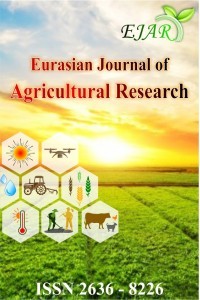Sustaining Vetiver grass Handicrafts: An Innovative Focus on Rural Area and Tourism
Sustaining Vetiver grass Handicrafts: An Innovative Focus on Rural Area and Tourism
Vetiver grass, Agritourism Handicraft, Rural,
___
- Benson, W., 2014. The Benefits of Tourism Handicraft Sales At Mwenge Handicrafts Centre In Dar Es Salaam, Tanzania, Tampereen Ammattikorkeakoulu Tampere University of Applied Sciences Degree Programme in Tourism.
- Boz, M., 2011. Leakages and Value Added in International Tourism Revenues; Tourism Satellite Account as A Measurement Method, International Journal of Business and Social Science, 2(24), 198-206.
- Chaudhry, M.S. and Sarwar, G., 2006. Leaf Anatomy of a Miracle C4 Grass: Vetiveria zizanioides L. Nash, Vetiver Systems: The Fourth International Conferance on Vetiver, Vetiver and People, ICV4, Caracas, Venezuela.
- Chomchalow, N., 2008. Other Uses and Utilization of Vetiver, Proceedings First Indian National Workshop, Vetiver System for Enviromental Protection and Natural Disaster Management, Chapter-6, 181-193, Cochin, India.
- Chomchalow, N., and Chapman, K., 2003. Other uses, and utilization of Vetiver, Proceedings of the Third International Conference on Vetiver and Exhibition, Guangzhou, China.
- Cındık, Y., 2012. An Investigation of the Possibilities for the Preventation of Erosion Using Vetiver grass (Vetiveria zizanioides (Linn.) Nash): The Case of Esiroğlu Area in Maçka Province of Trabzon, Karadeniz Technical University, The Graduate School of Natural and Applied Sciences, Landscape Architecture Graduate Program, Trabzon, Turkey.
- Demirel, O., and Demirel, K. 2005. An examination of the “Vetiver Grass” to prevent erosion in Yusufeli Region (Coruh Watershed Area-Turkey): A Case Study, Journal of Environmental Biology., 26(2), 409-419.
- DPT and JICA, 2004. Doğu Karadeniz Bölgesinde Turizmin Geliştirilmesine Yönelik Kalkınma Çalışması, Nihai Rapor Yönetici Özeti. Türkiye Cumhuriyeti Başbakanlık Devlet Planlama Teşkilatı Müsteşarlığı, Japonya Uluslararası İşbirliği Ajansı (JICA), BELDA LTD (Belde Proje Danışmanlık ve Ticaret Ltd. Şti) ve Semor (Seminer Organizasyon Danışmanlık ve Turizm A.Ş), Ankara. Governor of Trabzon, 2015. El sanatları. http://www.trabzon.gov.tr/el-sanatlari (accessed 20 March 2017).
- Graburn, N., 2006. Tourism and Handicrafts: Modernity and Identity in the Global Marketplace, Tourism and Handicrafts A Report on the International Conference on Tourism and Handicrafts, 13-15 May, Tehran, Islamic Republic of Iran.
- Hall, C.M., 1994. Tourism and Politics: Policy, power & place. Wiley, Chicester.
- Islam, M. P., Bhuiyan, K.H., and Hossain, M. Z., 2000. Vetiver grass a potential source for rural development in Bangladesh, Agricultural Engineering International: the CIGR Ejournal. Invited Overview No. 5. Vol. X.
- Karabaşa, S., 2012. Ekolojizmin Ortak Paydasında Geleneksel El Sanatları,Yeşil Tekstil ve Yavaş Moda (Sultan Sazlığı Örneği), Akdeniz Sanat Derneği. 4(8),1-3.
- Kayıkçı, S., 2009. Türkiye’de Kırsal Alan Yönetimi. Ankara Üniversitesi, Sosyal Bilimler Enstitüsü, Kamu Yönetimi ve Siyaset Bilimi (Yönetim Bilimleri) Anabilim Dalı, Doktora Tezi, Ankara, Türkiye.
- Kirici, S., Inan, M., Turk, M., and Giray, E.S., 2011. To study of essential oil and agricultural properties of vetiver (Vetiveria zizanioides) in the southeastern of Mediterranean, Advances in Environmental Biology, 5 (2), 447-451.
- Lavania, U., 2008. Historical Perspective and Prospective for Development of Specific Genotypes for Environmental or Industrial Application, Indian Vetiver Network, National Workshop on the Vetiver System, Vetiver System For Enviromental Protection and Natural Disaster Management, Cochin.
- Lavania, U.C., 2003. Other uses of vetiver: Vetiver oil, Proceedings of the Third International Conference on Vetiver and Exhibition, Guangzhou, China.
- Memişoğlu Bingöl, A., 2008. Bor ile kirlenmiş toprakların yeşil ıslah (Phytoremediation) yöntemi ile arıtılması / Phytoremediation of soil contaminated with boron. PhD thesis, Atatürk University, Institute of Science, Department of Environmental Engineering, Erzurum, Turkey.
- National Research Council -NRC, 1993. Vetiver Grass: A Thin Green Line against Erosion, National Research Council Board on Science and Techonology for International Development, National Academy Press, Washington, D.C.
- Neto, F., 2003. A New Approach to Sustainable Tourism Development: Moving Beyond Environmental Protection, ST/ESA/2003/DP/29 DESA, Discussion Paper No. 29, United Nations.
- O’Connor, D., 2006. Handicrafts and Their Linkage with Tourism Artisans Are Also Your Treasures, Tourism and Handicrafts A Report on the International Conference on Tourism and Handicrafts, 13-15 May, Tehran, Islamic Republic of Iran.
- Örnek, A., 2007. Kırsal Kalkınma El Kitabı, Heinrich Böll Stiftung Derneği Türkiye Temsilciliği, ISBN 978-975-00954-4-3.
- Özcüre, G., and Yavuz, C., 2006. El Sanatları Ürünlerinin Bulunduğu Yöreye Sosyo-Ekonomik Etkileri ve Katkıları (Ordu İli Örneği), Uluslararası Katılımlı Sanat Ekonomisi Sempozyumu Bildiri Kitapçığı, 167-183, Çanakkale, Türkiye.
- Panichpol, V., Waipanya, S., Siriwongse, M., and Srichoo, C., 1999. Analysis of chemical composition of Vetiveria zizanioides Nash for using as feed stuff, In: Abstracts of papers presented at ICV-3, 141, Thailand.
- Thomas, J., 2004. Vetiver Root Crafts in Bali. http://www.vetiver.org/INR_vet%20art_r.pdf (accessed 16 March 2017).
- Truong, P., 2008. South Indian vetiver handicraft. http://www.vetiver.org/IND_handicrafts.pdf. (accessed 20 March 2017).
- ISSN: 2636-8226
- Yayın Aralığı: Yılda 2 Sayı
- Başlangıç: 2017
- Yayıncı: Muhammed Cüneyt BAĞDATLI
Evaluation of the Göreme Historical National Park in Terms of Tourism Practices
Comparison of Some Chemical Properties of Amik, Gavur and Golbasi Lakes Soil’s
Ahu Alev ABACI BAYAN, Kadir YILMAZ
Şule SARIÇAM, K. Yaprak KANTOĞLU, Ş. Şebnem ELLİALTIOĞLU
Gökhan BÜYÜK, Ceren Ayşe BAYRAM, Muzaffer KIRPIK, Ahmet ÇELİK, Armağan KAYA, Erhan AKÇA, Halil İbrahim OĞUZ
Sustaining Vetiver grass Handicrafts: An Innovative Focus on Rural Area and Tourism
Yasemin CINDIK AKINCI, Öner DEMİREL
Molecular Identification, Virulens and Genetic Diversity of Fusarium species on Wheat
Filiz ÜNAL, F. Sara DOLAR, Nasibe TEKİNER, Nergiz Zeynep YEĞİN
Identification of Ecological Connectivity for Brown Bears: Example of Malatya Province
The Analysis of Problems in the Certification Application in State Forestry Administration in Turkey
